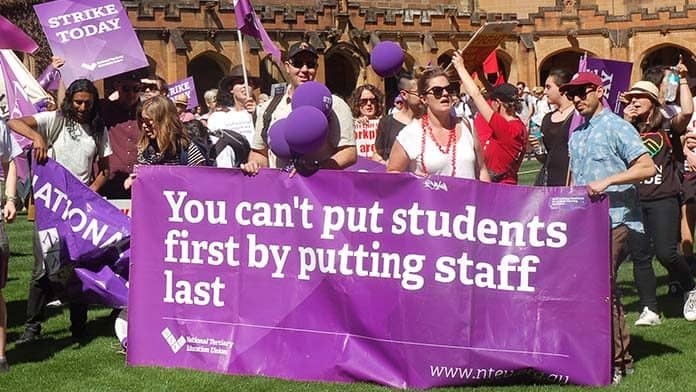Union members at Sydney University have sent a strong message to the National Tertiary Education Union (NTEU) leadership to reject the strategy of accepting cuts to wages and conditions in return for promises of jobs.
A union meeting of around 150 members yesterday voted almost unanimously for a motion opposing this defeatist approach, which had been flagged by the union’s national leadership without any prior consultation with members.
Members were furious when they received an email from the national office on Wednesday, which argued that: “To protect jobs, we may need to consider measures that we would never normally consider. These may include deferral of pay rises, providing the ability to direct taking of leave, or other cost saving measures.”
Deferring pay rises would mean a real wage cut, given that pay rises in our sector have barely kept up with inflation. Concessions now would also make it easier for bosses to push for the 20 per cent wages cut they have signalled they want.
Forcing staff to use up leave entitlements would undermine decades of hard-won conditions. And the unspecified “cost saving measures” leaves the door open to accepting the loss of hours and potential job cuts.
The email did not even mention the plight of casual staff who are facing some of the worst assaults. Hundreds have joined the union in recent weeks in the hope of a fight to win paid leave and stop sackings.
None of this had been discussed with members. Yet the national executive have signalled their intention to begin negotiating with university bosses over the Easter weekend.
So there was urgency to the meeting and it had a combative mood. Members effectively took over the agenda, forcing a discussion on the strategy outlined by the national executive.
Staff railed against the attacks from the university bosses and condemned this lack of fight from the union officials.
“It’s up to members who disagree to send a message that we won’t stand for this, that solidarity with casualised colleagues isn’t suspended just because of the crisis, and that we’re not going to let bureaucrats bargain our rights away,” said Nick Riemer.
There have already been widespread stand-downs, job losses and hours cut for casuals, alongside non-renewal of fixed term contracts. Those that do still have work face intensifying workloads from the shift to online teaching and a growing culture of hostile micro-management, where staff are not trusted to deliver classes and are increasingly under surveillance.
The motion passed condemned the start of negotiations on concessions without any discussion with the membership. It opposed the concessions proposed and called on the federal government to fund any revenue shortfall. It also called for rehiring any staff that had been sacked or lost hours this year, including casuals. And it demanded any negotiations with bosses take place with member input through national members meetings.
The extent of the anger in the meeting shows the potential for a fightback, but this has to be channelled into a campaign that takes on the bosses and the government.
Universities have lost income because of the drop in enrolments, but many of them have enormous cash reserves for emergency situations such as the current crisis. This includes Sydney University, which has up to $600 million in one of these rainy day funds. This money should be drawn down to cover any shortfall in expected revenue, with any remainder covered by the government.
It is appalling that Scott Morrison has refused to allow universities to access any extra government support during the crisis. Despite the large drop in income due to the ban on international students entering the country, universities are ineligible for the Job Keeper wage subsidy. Requests for a targeted support package for the sector have been refused.
Not all in it together
Scott Morrison claims there are no divisions between workers and bosses in the fight against the coronavirus, and that we’re all in it together on Team Australia.
But the Liberals, and also state Labor governments, are forcing public sector workers to pay the price through accepting pay freezes.
The Liberals’ priority is protecting business through various grants and loan schemes, yet they have left at least 2.2 million workers ineligible for their Job Keeper wage subsidy. Many migrant workers are facing destitution, barred from all government welfare payments as well.
Shamefully, a number of unions have opted to collaborate with the bosses in cutting wages and conditions instead of organising a fightback. Unions in the retail, hospitality and administrative sectors have made joint applications to Fair Work with employers to make these cuts. But there are no legally enforceable guarantees to the jobs they have been promised.
They claim that they need to do this in order to save jobs. But this approach puts no pressure on management to look after our jobs. They are just as likely to pocket the savings and press ahead with jobs cuts anyway. University managements have massively expanded rates of casualisation amongst staff in recent years and closed departments despite running large surpluses.
The only way we can guarantee the jobs and the conditions desperately needed now is through what we can win directly in our workplaces, through campaigning.
The campaign against the job cuts at Sydney University in 2012 saved hundreds of jobs through mass campaigning and a combative attitude to the bosses. It didn’t propose, nor did it accept, wage cuts or cuts to conditions to achieve this.
Ultimately, it will take industrial action to force the bosses to rehire stood down staff, lift the hiring freeze and guarantee wages. At the same time we have to fight the Morrison government for the support needed to fully fund our universities. If the universities threaten further job cuts, Morrison will be equally responsible—and we have to campaign relentlessly to make him wear the blame.
But we need to start by drawing a line in the sand and saying no to concessions on jobs and wages.
By Miro Sandev






